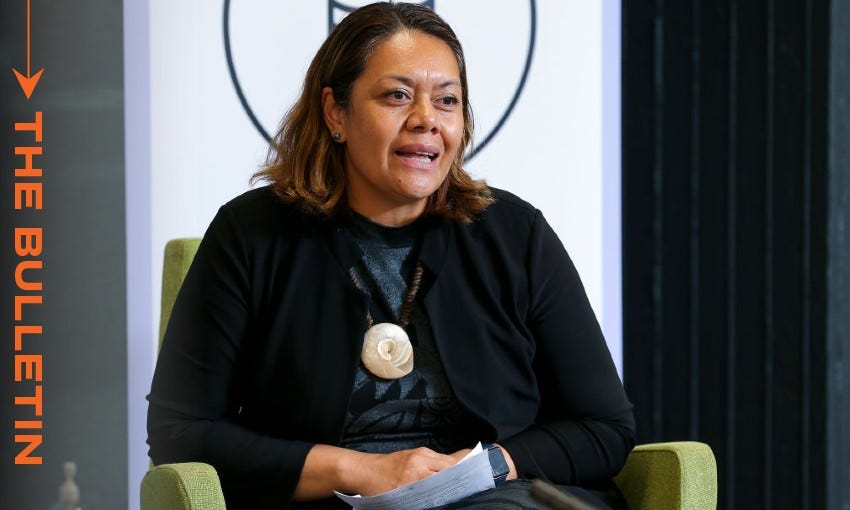Is the latest drama at Health NZ just the beginning?
A leaked memo, reports of a strained relationship, and questions over what it all means for frontline services.
Mōrena, and welcome to The Bulletin for Thursday, August 15.
In today’s edition: The OCR is reduced bringing with it lower interest rates for mortgage holders, the future of the disabilities ministry Whaikaha will be revealed and 501 deportees are on the agenda as Christopher Luxon heads across the ditch. But first, internal drama at Health NZ spills into the media.
Breaking point
Behind the scenes drama at the country’s health agency has spilled into the media, with tensions emerging between the newly appointed government commissioner and the existing chief executive. In an extensive report yesterday morning, Newsroom Pro’s Jonathan Milne first revealed details of a “fiery” meeting led by Te Whatu Ora leadership, and attended virtually by chief executive Margie Apa, in which 90 staff were told of potential wide-ranging cuts to roles across the country, including specialists and nurses. Commissioner Lester Levy was not in the meeting and was unaware of what was being discussed but later issued an internal statement, which was quickly circulated in the media. In the memo, Levy hit back at the supposed “cost savings” that had been discussed and said: “For the avoidance of doubt, what was presented is in direct conflict with our thinking and should be dismissed.” According to Milne’s report, tensions between Levy and Apa were now at “breaking point”.
The chief and the commissioner
It’s extraordinary to see such direct conflict between a commissioner and a chief executive, but it points to some of the teething issues as the mega agency undergoes a revamp. We’ve talked a bit about this in recent weeks, but here’s a brief refresher. Less than a month ago, the health minister Shane Reti confirmed the remaining board members at the health agency would be sacked and replaced by a commissioner, Lester Levy. It followed concerns over the state of Health NZ’s books, with Reti revealing the agency was overspending by $130m a month. But both Reti and the prime minister Christopher Luxon maintained there would be no impact on frontline services, despite recent reports of hiring freezes.
While there was no longer a board, the existing chief executive, Margie Apa, remained in her role. Apa has been with Health NZ since it replaced the country’s DHB network in 2022. At the time, in a wide-ranging interview with The Spinoff’s Toby Manhire, Apa was frank when discussing the health sector’s struggles post-pandemic. “We do not have enough health workers and we need more. We need to be investing in our workforce to develop the skills that they feel can add value to the care they provide.”
Are frontline roles safe?
The presentation delivered by health bosses suggests the agency was working to make wide-ranging cuts, but Levy, in his memo, expressly ruled out changes to frontline staffing. The government has been very open that it’s unimpressed with the performance of the health system, accusing Te Whatu Ora of being burdened by bureaucracy in the form of “14 layers of management” (a claim that opponents said wasn’t true), but has also promised critical services are safe. In recent weeks, there have been reports of telehealth services being used in hospitals due to staff shortages, while this in-depth piece in The Press signalled the health system was on the brink of collapse. Just yesterday, The Post reported on the uncertain future for major health projects in the capital.
Apa, reported Marc Daalder for Newsroom last month, said that the health agency’s poor finances were in part caused by a successful hiring drive for nurses as opposed to backroom staffing. This piece in The Conversation argues that “overspending” isn’t to blame, as asserted by the government, but historic underfunding that needs to be corrected.
Where to from here?
Things are only just beginning. In a speech in downtown Auckland yesterday, as reported by the Herald’s Nicholas Jones, Levy warned that an urgent overhaul of the health system would be far-reaching. “We have to face some very strong medicine as an organisation,” he said. Levy didn’t set a timeframe for this, or provide a lot of detail about what it may involve, but said the road ahead would be a challenging one. As The Post reported, Levy did not take questions from media after his speech.
There could be more to come in the aftermath of the leaked presentation, too. Apa and Levy fronted a joint press conference the day after the board was dismissed, reported the Herald’s Isaac Davison. Then, just a few short weeks ago, Levy said he had confidence in Apa. In Milne’s report for Newsroom yesterday, it would appear that confidence could be slipping. “There will be consequences,” said Levy. “I have spoken to Margie as the chief executive making it very clear this is unacceptable and is not to be ever repeated.” The Bulletin asked Shane Reti for his response, too. He sided firmly with the commissioner, saying he was disappointed in how the material had been communicated and reiterating that “these reforms are looking to increase frontline staff, not cut frontline staff”.
Show your support, join up today!
"As a New Zealander living in Sydney, The Spinoff helps me to feel in touch with what's happening back home. There's a great breadth to the content – and the enthusiasm from your contributors is palpable. I feel happy and proud to be a member." Ian, Sydney.
Whether living here or abroad, if you value our work please show your support by becoming a member today.
Is the cost of living crisis over?
As we discussed yesterday, there was a real chance – for the first time in years – that the Reserve Bank would opt to cut the official cash rate. That’s exactly what they did, reducing it by 25 basis points down to 5.25%. In its announcement, as reported by RNZ’s Anan Zaki, the central bank said it expected annual inflation to drop back within the target band in the September quarter. It’s welcome relief for mortgage holders, with banks quickly moving to reduce their interest rates in line with the OCR decision. The other group to move quickly: politicians. As Stuff’s Tova O’Brien writes this morning, the prime minister and others in the coalition were quick to claim victory for the OCR shift. O’Brien says there is good reason for this decision, as the economy is where elections are won and lost.
It’s likely too soon to determine whether this marks the end of the cost of living crisis, but one senior MP has claimed we’re well on the way. Associate finance minister David Seymour, in a tweet, said New Zealand had “finally turned the corner”.
Future of Whaikaha to be revealed today
The outcome of an independent review into disability services commissioned earlier in the year by the government will be made public today. The Herald’s Thomas Coughlan has obtained a copy of the report, writing that it will show Whaikaha is on track to blow its budget just six weeks into the current fiscal year. Problems with the ministry date back to its establishment two years ago, the report says. In response, it’s expected the government will take swift action to reform the struggling ministry, as Stuff’s Glenn McConnell reported yesterday. Those changes could include a substantial scaling down of Whaikaha, moving some of its functions to another ministry. The review was launched by the government after concerns over funding issues. The former minister in charge, Penny Simmonds, was stripped of her responsibilities as a result of her handling of these concerns, as The Spinoff’s Shanti Mathias looked at in this excellent feature.
Take part in The Spinoff survey for a chance to win one of three $400 Prezzy Cards!
Your feedback is crucial to us, and as an independent media company, we're committed to making your experience even better. The survey is quick, anonymous, and we’ll only use your email for the prize draw. Don’t miss out—click here to have your say and enter the draw!
Click and Collect
Christopher Luxon is heading to Australia and as night follows day it’s been reported that the issue of 501 deportees will be high on the agenda for a meeting with Anthony Albanese.
I promised another explainer on the end of the gene editing ban yesterday morning, and here it is. A comprehensive look at what it all means from The Spinoff’s Gabi Lardies.
The Spinoff’s Liam Rātana has written an interesting and balanced opinion piece looking at Don Brash, Hobson’s Pledge and *that* ad in the NZ Herald. It’s a good read.
The government has announced plans for a substantive overhaul of the Companies Act, “the legislative framework that governs the birth, life and, sometimes, death of a company”. (paywalled)
The Post’s Andrea Vance reports that David Seymour’s new regulation ministry is hiring a “$168k-a-year spin doctor”.
Want to see more concerts at Eden Park? So does Eden Park.
Air New Zealand won’t be the last company to miss its climate goals (The Conversation).
Max Rashbrooke reflects on what happened the last time we sanctioned beneficiaries. Claire Mabey liveblogged yesterday's NZ Book Awards for Children and Young People. Jeremy Hansen praises Wellington's City to Sea Bridge. Lyric Waiwiri-Smith considers the latest in the public sector following cuts, closures and a culture of “restraint”.
That’s it for today, thanks for reading. I’ll see you back here tomorrow morning.
Let me know in the comments, or get in touch with me via email at thebulletin@thespinoff.co.nz, if you have any feedback on today’s top stories or anything in the news.
If you liked what you read today, share The Bulletin with friends, family and colleagues.
















We are being governed by bullies, who not only bully personally, but appoint/employ/amplify other bullies to beat us down & make us cry 🤬 This Levy person is an example outside of ministerial control by US - i.e. we can't un-elect HIM and exert any citizen control/sanction over him as with an elected official. Even though we know the weak-as-whatever PM WOULDN'T do it anyway, even Luxon has no control over him & his private & public utterances (glad to be proved otherwise if I'm wrong?)
These bully Ministers don't take on people who can resist meaningfully or fight back with big $$ & revolving-door lobbyists in their ears when they make decisions - no, they bully beneficiaries, and the disabled community & their support networks, and health workers from GPs on down, and struggling families whose power bills, rates, insurance, food, prescription charges etc. etc. have gone up far beyond whatever measly tax reduction they got ($4.30 a fortnight for a fixed income retiree ?) And much of this comes from coalition partners who between them got a small minority of votes - I guess we should give them some credit for being ruthless in wielding that minority for excessive power so Luxon et al can pretend they are the govt?